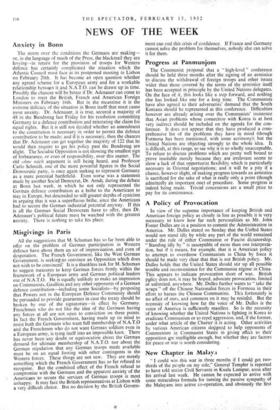A Policy of Provocation
In view of the supreme importance of keeping British and American foreign policy as closely in line as possible it is very necessary to know how far such personalities as Mr. John Foster Dulles are in a position to commit the Administration in America. Mr. Dulles stated on Sunday that the United States would not stand idly by while any part of the world remained under the rule of either Communist or Fascist dictatorship. " Standing idly by " is susceptible of more than one interpreta- tion, but if it means, for example, that it is American policy to attempt to overthrow Communism in China by force it should be made very clear that that is not British policy. Mr. Dulles holds that the United States should stir up all possible trouble and inconvenience for the Communist regime in China. This appears to indicate provocation short of war. British pglicy does not, it may be hoped, advocate provocation, limited or unlimited, anywhere. Mr. Dulles further wants to " take the wraps " off the Chinese Nationalist forces in Formosa in their effort to harass the Chinese Communists. This fortunately is no affair of ours, and comment on it may be resisted. But the necessity of knowing how far the voice of Mr. Dulles is the voice of America is sufficiently manifest. So is the necessity of knowing whether the United Nations is fighting in Korea to eradicate Communism or to repel aggression, and, if the former, under what article of the Charter it is acting. Other activities by various American citizens dekigned to help opponents of Communism in Communist States in giving effect to their opposition are intelligible enough, but whether they are factors for peace or war is worth considering.


























 Previous page
Previous page